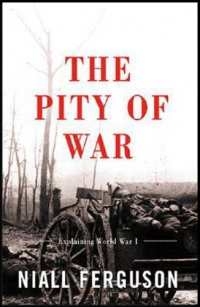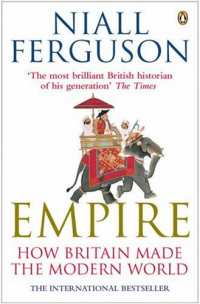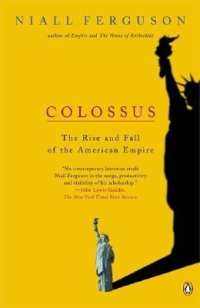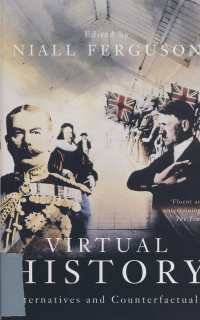
Niall Ferguson
*18.4.1964 in Glasgow, Schottland
 |
Niall Ferguson *18.4.1964 in Glasgow, Schottland |
1964 geboren in Glasgow
1986 Abschluss am Magdalen College, Oxford-Universität
1987-1988 Hanseatic Scholar in Hamburg und Berlin
1989-1990 Research Fellow, Christ’s College, Cambridge-Universität
1990–1992 Official Fellow and Lecturer, Peterhouse, Cambridge-Universität
1992-2000 Fellow und Tutor in Modern History am Jesus College, Oxford-Universität
2000-2002 Professor of Political and Financial History, Oxford-Universität
2002-2004 John Herzog Professor in Financial History at Stern School of Business, New York-Universität
seit 2004 Laurence A. Tisch Professor of History und William Ziegler Professor of Business Administration an der Harvard Business School
2010-2011 Philippe Roman Chair in History and International Affairs an der London School of Economics
2011 zweite Ehe mit der Islamkritikerin Hirsi Ali
Preise
2009 Emmy Award für die beste Dokumentation mit „Ascent of Money“.
2011 Preis für die beste Dokumentation „Kissinger. A Life.”, New York Film Festival
Primärliteratur
Bücher
Paper and Iron: Hamburg Business and German Politics in the Era of Inflation, 1897–1927. Cambridge: Cambridge University Press 1995.
The World’s Banker: The History of the House of Rothschild. London: Weidenfeld & Nicolson 1998.
The Pity of War. London: Allen Lane/Penguin Press 1998.

The Cash Nexus: Money and Power in the Modern World, 1700-2000. London: Allen Lane/Penguin Press 2001.

Empire: How Britain Made the Modern World. London: Allen Lane/Penguin Press 2003.

Colossus: The Rise and Fall of the American Empire. London: Allen Lane/Penguin Press 2004.

The War of the World: History’s Age of Hatred. London: Allen Lane/Penguin Press 2006.

The Ascent of Money: A Financial History of the World. New York: Penguin Press 2008.
High Financier: The Lives and Time of Siegmund Warburg. New York: Penguin Press 2010.
Civilization: The West and the Rest. New York: Penguin Press 2011.
Henry Kissinger: A Life. New York: Penguin Press 2012.
Herausgeberschaften
Virtual History: Alternatives and Counterfactuals. London: Macmillan 1997.

mit Oliver Wyman: The Evolution of Financial Services. London/New York: Oliver Wyman 2007.
Aufsätze
Public Finance and National Security: The Domestic Origins of the First World War Revisited. In: Past & Present 142.1994. S. 141–168.
Keynes and the German Inflation. In: English Historical Review 436.1995. S. 368–391.
Constraints and Room for Manoeuvre in the German Inflation of the Early 1920s. In: Economic History Review 4.1996. S. 635–666.
mit Brigitte Granville: ‘Weimar on the Volga’: Causes and Consequences of Inflation in 1990s. Russia compared with 1920s Germany. In: Journal of Economic History 60. 2000. S. 1061–1087.
The Dynamics of Defeat: Prisoner Taking and Prisoner Killing in the Age of Total War. In: War in History 11.2004. S. 34–78.
Political Risk and the International Bond Market Between the 1848 Revolution and the Outbreak of the First World War. In: Economic History Review 59.2006. S. 70-112.
mit Moritz Schularick: The Empire Effect: The Determinants of Country Risk in the First Age of Globalization, 1880–1913. In: Journal of Economic History 66.2006. S. 283-312.
mit Moritz Schularick: ‘Chimerica’ and Global Asset Markets. In: International Finance 10.2007. S. 215-239.
with Laurence J. Kotlikoff: Going Critical: American Power and the Consequences of Fiscal Overstretch. In: The National Interest 73.2003. S. 22–32.
Sinking Globalization. In: Foreign Affairs 84.2005, 2. S. 64–77.
Empires with Expiration Dates. In: Foreign Policy 2006. S. 46-52.
The Next War of the World. In: Foreign Affairs 85.2006, 5. S. 61-74.
Europa Nervosa. In: Nader Mousavizadeh (Hrsg.): The Black Book of Bosnia: The Consequences Of Appeasement. New York: Basic Books 1996. S. 127–132.
The German Inter-war Economy: Political Choice Versus Economic Determinism. In: Mary Fulbrook (Hrsg.): German History since 1800. London: Arnold 1997. S. 258–278.
The Balance of Payments Question: Versailles and After. In: Manfred F. Boemeke, Gerald D. Feldman and Elisabeth Glaser (Hrsg.): The Treaty of Versailles: A Reassessment after 75 Years. Cambridge: Cambridge University Press 1998. S. 401–440.
‘The Caucasian Royal Family’: The Rothschilds in National Contexts. In: R. Liedtke (Hrsg.): ‘Two Nations’: The Historical Experience of British and German Jews in Comparison. Tübingen: J.C.B. Mohr 1999.
Academics and the Press. In: Stephen Glover (Hrsg.): Secrets of the Press: Journalists on Journalism. London: Penguin 1999. S. 206-220.
Metternich and the Rothschilds: A Reappraisal. In: Andrea Hamel and Edward Timms (Hrsg.): Progress and Emancipation in the Age of Metternich: Jews and Modernisation in Austria and Germany, 1815–1848. Lampeter: Edwin Mellen Press 1999. S. 295-325.
The European Economy, 1815–1914. In: T.C.W. Blanning (Hrsg.): The Short Oxford History of Europe: The Nineteenth Century. Oxford: Oxford University Press 2000. S. 78-125.
How (not) to Pay for the War: Traditional Finance and Total War. In: Roger Chickering and Stig Förster (Hrsg.): Great War, Total War: Combat and Mobilization on the Western Front. Cambridge: Cambridge University Press 2000. S. 409–434.
Introduction. In: Frederic Manning , Middle Parts of Fortune. London: Penguin 2000. S. vii-xviii.
Clashing Civilizations or Mad Mullahs: The United States between Informal and Formal Empire. In: Strobe Talbott (Hrsg.): The Age of Terror. New York: Basic Books 2001. S. 113–141.
Public Debt as a Post-war Problem: The German Experience after 1918 in Comparative Perspective. In: Mark Roseman (Hrsg.): Three Post-War Eras in Comparison: Western Europe 1918-1945-1989. Basingstoke: Palgrave-Macmillan 2002. S. 99–119.
Das Haus Sachsen-Coburg und die Europäische Politik des 19. Jahrhunderts. In: Rainer von Hessen (Hrsg.): Victoria Kaiserin Friedrich (1840–1901): Mission und Schicksal einer englischen Prinzessin in Deutschland. Frankfurt: Campus Verlag 2002. S. 27–39.
Max Warburg and German Politics: The Limits of Financial Power in Wilhelmine Germany. In: Geoff Eley and James Retallack (Hrsg.): Wilhelminism and Its Legacies: German Modernities, Imperialism and the Meaning of Reform, 1890-1930. Oxford: Berghahn Books 2003. S. 185-201.
Globalization in Historical Oerspective: The Political Dimension. In: Michael D. Bordo, Alan M. Taylor and Jeffrey G. Williamson (Hrsg.): Globalization in Historical Perspective. Chicago: University of Chicago Press 2003.
The City of London and British Imperialism: New Light on an Old Question. In: Youssef Cassis and Eric Bussière (Hrsg.): London and Paris as International Financial Centres in the Twentieth Century Oxford: Oxford University Press 2004. S. 57–77.
A Bolt from the Blue? The City of London and the Outbreak of the First World War. In: Roger Louis (Hrsg.): Yet More Adventures with Britannia: Personalities, Politics and Culture in Britain. London: I.B. Tauris, 2005. S. 133–145.
The First ‘Eurobonds’: The Rothschilds and the Financing of the Holy Alliance, 1818–1822. In: William N. Goetzmann and K. Geert Rouwenhorst (Hrsg.): The Origins of Value: The Financial Innovations that Created Modern Capital Markets. Oxford: Oxford University Press 2005. S. 311–323.
The Second World War as an Economic Disaster. In: Michael Oliver (Hrsg.): Economic Disasters of the Twentieth Century. Cheltenham: Edward Elgar 2007. S. 83-132.
The Problem of Conjecture: American Strategy after the Bush Doctrine. In: Melvyn Leffler and Jeff Legro (Hrsg.): To Lead the World: American Strategy After the Bush Doctrine. Oxford: Oxford University Press 2008.
Links
http://www.niallferguson.com
Videos unter: http://www.niallferguson.com/video
AK/CH